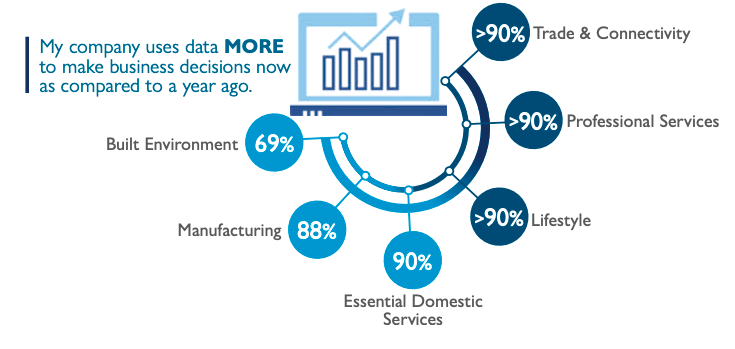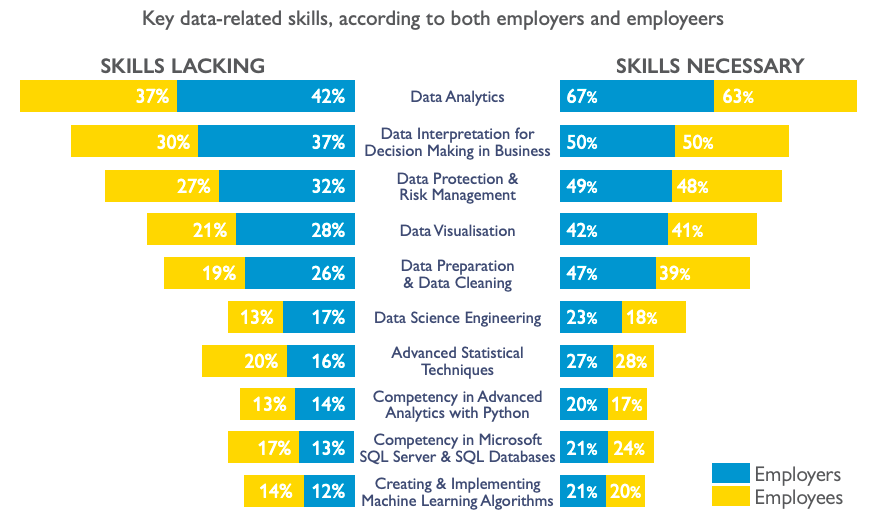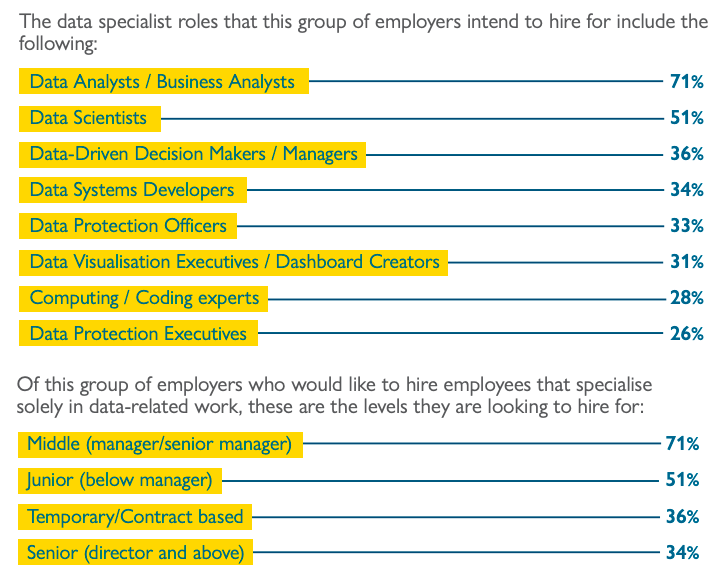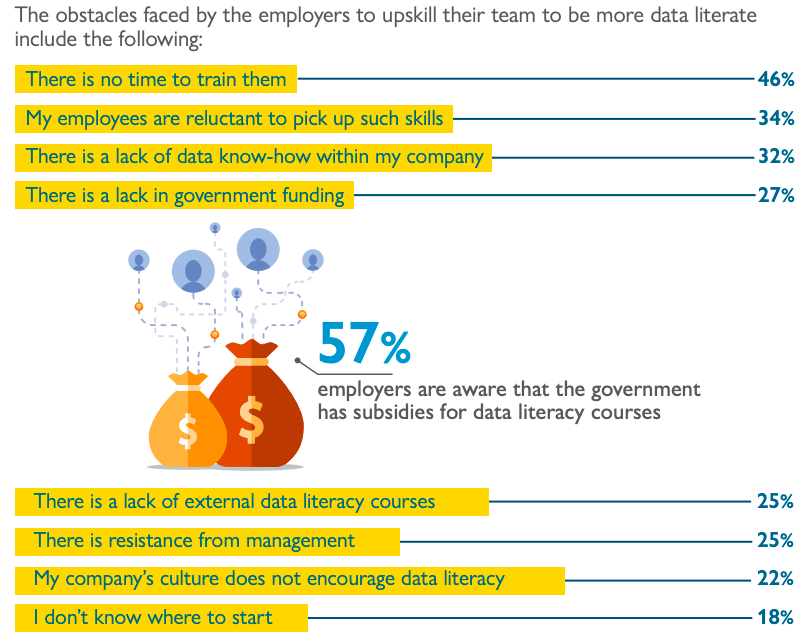share on
As Singapore progressively reopens its economy, majority of companies in Singapore have voiced that the data literacy of their workforce is more important now than before the COVID-19 outbreak.
However, the recently launched NTUC LearningHub Data Skills report found that a data skills gap is hindering the productivity of 94% of employers in Singapore.
The report titled "A View From the Ground: Closing the Data Skills Gap in the Covid-19 Era and Beyond" uncovered 5 key trends in reliance of data and business intelligence, perception of data-related competencies, hiring trends, and more. It also shared key recommendations for business leaders on harnessing the power of data to remain competitive.
[Jump straight to the recommendations for business leaders]
Trend 1: Increasing use of data in Singapore across the board
Almost all (94%) of employers surveyed said they have increased their reliance on data and business intelligence to make business decisions now as compared to a year ago, with 88% of employees agreeing to the sentiment.
Industry clusters such as Professional Services, Trade & Connectivity, and Lifestyle top the list when it comes to experiencing increasing use of data in the workplace to drive business decisions with over 90% of business leaders in these categories saying so, as compared to those in Manufacturing (88%) and Build Environment (69%).

Trend 2: Data is considered crucial to business and daily work, but there is a perceived lack in data-related competencies
Almost all employers (97%) and employees (93%) think that it is ‘very important’ or ‘important’ for employees to understand data well in order for the company to be successful.
However, employers generally found that their employees are not data literate enough, with 93% saying that if their employees improved their data competencies, the latter would be able to do the job better.
At the same time, employees were not confident in their own data competencies, and to a smaller extent, that of their leaders.
The large majority of employees (92%) either strongly agreed or agreed that they could be able to do their job better if they could understand data better. About a third (28%) expressed a lack of confidence in their senior management’s ability to use data to improve business performance.
The report also uncovered a prevalent skills gap as employers identified the data-related skills which were necessary but lacking in their workforce.
Employers voted Data Analysis (voted by 67%), Data Interpretation for Decision Making in Business (voted by 50%), and Data Protection and Risk Management (voted by 49%) as the most necessary data skills for their businesses. At the same time, these skills were perceived as lacking within their companies as voted by 47%, 37% and 32% of employers respectively.
 Trend 3: Employers are willing to pay more to hire employees with data-related competencies
Trend 3: Employers are willing to pay more to hire employees with data-related competencies
One in three employers felt that their workforce do not have the necessary data-related skills that are relevant to their business.
Hence, 90% of employers have expressed keen interest in hiring employees who are data literate, and 53% of them indicated that they intend to hire employees that specialise solely in data-related work.
As such, employers are willing to pay a premium for data-literate talent. Almost half (48%) of employers indicated that they would be willing to pay up to 10% more for data literate employees in non-data specialised job roles. Further, 66% of employers indicated that they would be willing to pay more for someone who is data literate for a role that did not require data specialisation.
About four in five (82%) have indicated they would hire between one to four employees for roles that specialise solely in data-related work. In particular, they are looking for roles including data analysts/business analysts (71%), data scientists (51%), and data-driven decision makers/managers (36%).

Trend 4: Employers lack training programmes in data literacy
The report revealed that among the employers who ‘strongly agree’ or ‘agree’ to the statement “if my employees understand data better, they would be able to do their job better,” only 36% have data literacy training programmes in place, while 64% indicated that they have no such training programmes.
Key obstacles faced by employers to upskill their team to be data literate included a lack of time (46%), employees being reluctant to pick up the skills (34%), and the lack of data know-how within the company (32%).
Interestingly, despite 57% of employers being aware that the government has subsidies for data literacy courses, 27% employers cited a lack of government funding as a key obstacle towards upskilling their team to be more data literate.
 Trend 5: Employees cite lack of support from employers as the top reason for not upskilling in data
Trend 5: Employees cite lack of support from employers as the top reason for not upskilling in data
An overwhelming majority of employees (91%) said they recognise the importance to upskill themselves in data literacy to do their job well. The same percentage have also indicated that they intend to upskill themselves in data literacy in the near future.
Among employees who mentioned that upskilling in data is important, but did not intend, top reasons included ‘lack of training support available in my company’ (38%), ‘I do not have time’ (33%), and ‘courses are too expensive for my budget’ (26%).
On the topic of the responsibility of upskilling, 56% of employees felt that companies should be responsible for ensuring the workforce is data literate, while 53% of employers felt employees should be responsible for ensuring they are data literate to stay relevant to the company.
NTUC Learning Hub CEO Kwek Kok Kwong, said: “As companies are thrusted into transformation during this Covid era, employers have actively reassessed the workforce they need in order to navigate the new economy. The COVID-19 storm is far from over and all business leaders must work out their strategies in weathering this very turbulent and uncertain period ahead. In this complex business environment, data will help us a lot in supporting our intuition as we make difficult business decisions.”
5 steps business leaders can take to harness the power of data
The report also shared five key recommendations for business leaders to take charge in harnessing the power of data and champion data literacy in their workforce to do so.
1. Understand and define how you want to leverage data to achieve your business goals
In order to provide adequate training to your employees, it is important to first recognise and prioritise business objectives and how you hope to use data to improve your business to streamline decision processes. From leveraging data analytics to manage supply chains, to using business intelligence to gain customer insights, there are endless possibilities to the purposes that data can serve in driving business transformation.
2. Democratise data within your organisation
Make data available within an organisation. In order to maximise productivity and make decisions, organisations need to break down data silos between departments while instituting access control. Easily accessible data will push businesses towards data democratisation, allowing employees of different roles, to independently capitalise on data insights.
3. Communicate the importance of data literacy
Explain to your employees the importance of data-related skills and ways that these data skillsets could improve their work processes. It should not only be about the business benefits but also how it could help them in their career and work responsibilities. When employees understand how data literacy could impact their work, it will be easier to motivate them to upskill.
4. Engage teams with data in their daily work
Leaders can demonstrate the importance of data by actively using it in the way they communicate. Like learning a language, data requires frequent practice for you to increase proficiency and competency. Encourage and familiarise your employees in using data by incorporating data in everyday work task.
5. Strike a balance between machine and humans
Data and human insights go hand in hand when making informed data driven decisions. Establishing a balance between the two allows your business and employees to reach the best possible conclusion when working with data.
Infographics / NTUC LearningHub
Photo / iStock
share on
Follow us on Telegram and on Instagram @humanresourcesonline for all the latest HR and manpower news from around the region!
Related topics



